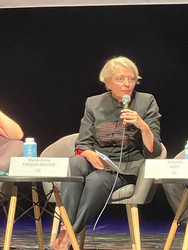
Oct. 9, 2024
Publications

🌐follow Marie-Anne Frison-Roche sur LinkedIn
🌐subscribe to the Newsletter MAFR Regulation, Compliance, Law
🌐subscribe to the Video Newsletter MAFR Overhang/Surplomb
____
 ► Full Reference: M.-A. Frison-Roche, Monumental Goals, normative anchoring of Compliance, Working Paper, February 2025.
► Full Reference: M.-A. Frison-Roche, Monumental Goals, normative anchoring of Compliance, Working Paper, February 2025.
____
🎬This working document has been drawn up to serve as basis to
the video Overhang👁 of the 1st February 2025: click HERE
____
🎬🎬🎬In the collection of the Overhangs👁 It falls into the Notions category.
►Watch the complete collection of the Overhangs👁 : click HERE
____
► Summary of this Working Paper: Compliance, of which conformity is only one instrument (the 2 should not be confused), must be understood through the ‘Monumental Goals’ : political ambitions pursued by the public authorities and internalised in the entities in a position to achieve them, i.e. large companies.
These Goals are Monumental in that they concern systems: ensuring that these systems do not collapse in the future = ‘Negative Monumental Goals’ (e.g. fight against corruption, against climate change); more ambitious still, they may aim to improve systems = ‘Positive Monumental Goals’ (e.g. effective equality between women and men).
Their systemic nature gives rise to Systemic Litigation.
____
🔓read the developments below⤵️
June 19, 2023
Conferences

♾️ follow Marie-Anne Frison-Roche sur LinkedIn
♾️subscribe to the Newsletter MAFR Regulation, Compliance, Law
____
► Full Reference: M.-A. Frison-Roche, participation in the panel "Vigilance (due diligence)", in International Law Association (ILA), 150th Anniversary Symposium of the ILA/ADI, Paris, 19 June 2023.
____
🧮See the full programme of this event
________
Sept. 16, 2020
Publications

🌐follow Marie-Anne Frison-Roche on LinkedIn
🌐subscribe to the Newsletter MAFR Regulation, Compliance, Law
____
Full reference: M.-A. Frison-Roche, Se tenir bien dans l'espace numérique, in Penser le droit de la pensée. Mélanges en l'honneur de Michel Vivant, Lexis Nexis and Dalloz, 2020, pp. 155-168.
____
📝Read the article (in French)
____
English summary of the article: The digital space is one of the scarce spaces not framed by a specific branch of Law, Freedom also offering opportunity to its actors to not "behave well", that is to express and diffuse broadly and immediately hateful thoughts through Hate speechs, which remained before in private or limited circles. The intimacy of Law and of the legal notion of Person is broken: Digital permits to individuals or organizations to act as demultiplied and anonymous characters, digital depersonalized actors who carry behaviors that are hurtful to other's dignity.
Against that, Compliance Law offers an appropriate solution: internalizing in digital crucial operators the mission to disciplinary and substantially hold the digital space. The digital space has been structured by powerful firms able to maintain order. Because Law must not reduce digital space to be only a neutral market of digital prestations, these crucial operators, like social networks or search engines, must be forced to substantially control behaviors. It could be about an obligation of internet users to act with their face uncover, "real identity" policy controlled by firms, and to respect others' rights, privacy rights, dignity, intellectual property rights. In their Regulatory function, digital crucial firms must be supervised by public authorities.
Thus, Compliance law substantially defined is the protector of the person as "subject of law" in the digital space, by the respect that others must have, this space passing from the status of free space to the one of civilized space, in which everyone is obliged to behave well.
______
Read to go further:
- Frison-Roche, M.-A., L'apport du Droit de la Compliance à la gouvernance d'Internet, 2019
- Frison-Roche, M.-A. (dir.), Internet, un espace d'interrégulation, 2016

Updated: July 4, 2019 (Initial publication: April 30, 2019)
Publications

► Complete reference : Frison-Roche, M.-A., Having a good behavior in the digital space, working paper, April 2019.
____
Summary: The jurist sees the world through the way he learns to speak
The Law of the Environment has already come to blur this distinction, so finally so strange because this classical conception refers to a person taken firstly in his immobility (Law of individuals), and then in his only actions (Contrats and Tort Law, Property Law). Indeed, the very notion of "environment" implies that the person is not isolated, that he/she is "surrounded", that he/she is what he/she is and will become because of what surrounds him/her ; in return the world is permanently affected by his/her personal action. On second thought, when once "Law of Individuals" was not distinguished from Family Law, the human being was more fully restored by this division in the legal system that not only followed him/her from birth to death but also in him/her most valuable interactions: parents, siblings, couples, children. Thus Family Law was finer and more faithful to what is the life of a human being.
To have instituted Law of Individuals, it is thus to have promoted of the human being a vision certainly more concrete, because it is above all of their identity and their body about what Law speaks, astonishing that we have not noticed before that women are not men like the others. To have instituted the Law of the people, it is thus to have promoted of the human being a vision certainly more concrete, because it is above all of his identity and his body that one speaks to us, astonishing that the we have not noticed before that women are not men like the others
From this concrete vision, we have all the benefits but Law, much more than in the eighteenth century, perceives the human being as an isolated subject, whose corporeality ceases to be veiled by Law
This freedom will come into conflict with the need for order, expressed by society, social contract, state, law, which imposes limits on freedom of one to preserve freedom of the other, as recalled by the French Déclaration des Droits de l'Homme of 1789. Thus, it is not possible de jure to transform every desire in action,, even though the means would be within reach of the person in question, because certain behaviors are prohibited in that they would cause too much disorder and if they are nevertheless committed, they are punished for order to return. Thus, what could be called "law of behavior", obligations to do and not to be put in criminal, civil and administrative Law, national and international Law, substantial Law and procedural Law :they will protect the human being in movment pushed by the principle of freedom forward others and thing, movement inherent in their status as a Person.
The human being is therefore limited in what they want to do. In the first place by the fact: their exhausting forces, their death that will come, the time counted, the money that is lacking, the knowledge that they does not even know not holding, all that is to say by their very humanity; Secondly, by the Law which forbids so many actions ...: not to kill, not to steal, not to take the spouse of others, not to pass as true what is false, etc. For the human being on the move, full of life and projects, Law has always had a "rabat-joy" side. It is for that reason often ridiculous and criticized because of all its restraining regulations, even hated or feared in that it would prevent to live according to our desire, which is always my "good pleasure", good since it is mine. Isolated and all-powerful, the human being alone not wanting to consider other than its desire alone.
Psychoanalysis, however, has shown that Law, in that it sets limits, assigns to the human being a place and a way of being held with respect to things and other persons. If one no longer stands themselves by the prohibition of the satisfaction of all desire (the first of which is the death of the other), social life is no longer possible
But this presentation aims to make it possible to admit that the criterion of Law would be in the effectiveness of a sanction by the public power: the fine, the prison, the confiscation of a good, which the rudeness does not trigger whereas Law would imply it: by this way we are thus persuaded of the intimacy between the public power (the State) and Law... But later, after this first lesson learned, the doubt comes from the consubstansuality between Law and State. Is it not rather appropriate to consider that Law is what must lead everyone to "behave well" with regard to things and people around them? The question of punishment is important, but it is second, it is not the very definition of Law. The French author Carbonnier pointed out that the gendarme's "kepi" is the "Law sign", that is to say what it is recognized without hesitation, but it is not its definition.
The first issue dealt with by Law is then not so much the freedom of the person as the presence of others. How to use one's freedom and the associated deployment of forces in the presence of others? How could I not using it when I would like to harm them, or if the nuisance created for them by the use of my free strength is indifferent to me
We do not use our force against others because we have interest or desire, we do not give him the support of our strength while he indifferent us, because Law holds us. If the superego was not enough. If Law and the "parental function of the States" did not make alliance. We do it because we hold ourselves
Or rather we were holding ourselves.
Because today a new world has appeared: the digital world that allows everyone not to "hold" himself, that is to say to constantly abuse others, never to take them into consideration, to attack massively. It's a new experience. It is not a pathological phenomenon, as is delinquency (which simply leads to punishment), nor a structural failure in a principle otherwise admitted (which leads to regulatory remedies) but rather a new use, which would be a new rule: in the digital space, one can do anything to everyone, one is not held by anything or anyone, one can "let go" (I). This lack of "good behavior" is incompatible with the idea of Law, in that Law is made for human beings and protect those who can not afford to protect themselves; that is why this general situation must be remedied (II).
Cornu, G., Linguistique juridique, 2005.
Frison-Roche, M.-A. & Sève, R., Le Droit au féminin (ed.), 2003.
Under this "mask" of the "subject of Law", we are all equal. S. Archives de Philosophie du Droit, Le sujet de droit, 1989.
Baud, J.P., L'affaire de la main volée. Histoire juridique du corps humain, 1993.
On neurosis as a constitutive mode of child sociability, s. Lebovici, S., "C'est pas juste", in La justice. L'obligation impossible, 1994.
Read the article of Alain Supiot about the idée of Rule common of all, under the discussion between all, presented by this author through the artwork of Kafka : "Kafka, artiste de la loi", 2019; Kafka is very present in the work of Alain Supiot, for example in his First Lesson in the Collège de France, 2012, or in an Introduction of La Gouvernance par les nombres ; This latter book is now available in English : Governance by numbers. The making a legal model of allegiance, 2017 (translated by S. Brown).
That's why splitting Persons Law and Family Law masks another reality: the family is not made up of third parties. The links are there. They pre-exist. Starting from the only Persons Law pushes to think one can "build" his/her family by links drawn on white paper: the contracting of the families made up of individuals becomes thinkable, even natural.
Oct. 29, 2015
Blog

Le "lancer de nain", c'est une "séquence figée" que les étudiants apprennent par cœur, l'exemple-type du sujet d'examen, l'occasion d'en fêter l'anniversaire...
C'est une antienne dans les enseignements de droit. C'est un morceau de choix au cinéma.
Les étudiants, par docilité, adhésion aux grands principes qui défendent la personne, ont tendance dans leur copie, à conclure dans le II.B.2 : "comme c'est beau, comme c'est grand", estimant ainsi atteindre au moins 13/20.
Mais le journal Libération a eu l'idée de demander son avis à l'intéressé. Celui-ci n'est pas content. Pas content du tout. Son réquisitoire est terrible.
«Les putes gagnent bien leur vie avec leur cul. Pourquoi je ne pourrais pas être lancé en France ? Elle est où la liberté d’expression ?» «Le Conseil d’État décide du bonheur des gens contre leur gré». Il estime qu'on lui a ôté sa liberté de travailler et regarde les pays où les nains disposent de la liberté d'être lancés. Lui, il reste en France, où il touche le RSA. Il pense que le Conseil d'État a brisé sa vie.
Il continue et il a raison de l'affirmer : Le Conseil d’État, parce qu'il veut faire le bonheur des gens malgré eux, a fait son malheur.
Il envisage d'en demander compensation financière à l’État.
Rétrospectivement, est-ce donc une mauvaise décision ? Puisqu'on songe à une compensation financière, y aura-t-il eu une faute à décider ainsi ?
Cela dépend de l'office de la jurisprudence.
Reprenons la situation. Si on l'analyse comme un "cas", réduit aux seules personnes particulières, sans doute a-t-il raison. Mais les juges ne portent pas que cela, ne sont pas que des personnes qui arrangent au mieux les difficultés particulières des cas concrets. Dans certains cas, il y a des principes qui sont impliqués, sans doute contre le gré des personnes particulières en cause, et là c'est la jurisprudence qui apparaît. Sinon, cela n'est pas la peine de constituer des tribunaux, de prévoir des procédures, et de mettre l'ensemble au cœur des systèmes démocratiques.
Reprenons la situation :
Updated: July 31, 2013 (Initial publication: Dec. 6, 2011)
Teachings : Les Grandes Questions du Droit, semestre d'automne 2011

Updated: July 31, 2013 (Initial publication: Sept. 20, 2011)
Teachings : Les Grandes Questions du Droit, semestre d'automne 2011

Nov. 22, 2010
Interviews

► Référence complète : M.-A. Frison-Roche, «"Entretien autour de l'ouvrage Droits et libertés fondamentaux" , entretien avec Monique Canto, France Culture, Emission Questions d'éthique, 22 novembre 2010.
___
► Présentation synthétique de l'entretien : L'entretien aborde tout d'abord la définition même des libertés et droits fondamentaux, son évolution et sa diversité. Il montre que leur montée en puissance a été contestée, notamment parce qu’en réalité, faute de moyens, ils seraient vides, mais la critique tombe si l’on pose que ces droits ne visent que les droits essentiels. En outre, le souci des libertés et droits fondamentaux met ceux-ci au cœur du système juridique et par cela le juge. Celui-ci prend plus particulièrement la forme du juge constitutionnel. La montée en puissance du juge est donc corrélative. En ce qui concerne les droits eux-mêmes, ils croisent la notion de dignité, qui trouve un équilibre difficile avec la protection que la liberté assure à la volonté des personnes. De cela aussi, le droit est familier, puisqu’il met sans cesse en balance les contraires. Mais, parce que le juge est au cœur de tout, le droit le plus fondamental est celui d’accéder à un tribunal impartial et d’obtenir de lui un jugement exécuté.
► Présentation de la discussion:
Monique Canto-Sperber débute l’entretien à propos de la définition même des libertés et droits fondamentaux, car les libertés publiques ne sont pas une notion nouvelle et l’on en retrouve l’idée notamment dans la philosophie des Lumières.
Marie-Anne Frison-Roche insiste sur le fait que la notion de droits fondamentaux est elle plus contraignante en ce qu’il s’agit non plus de possibilité d’action d’un individu dans un espace public ouvert, mais de prérogatives effectives établissant un lien de créance, dont le débiteur sera le plus souvent l’Etat.
La discussion s’engage alors sur l’effectivité de ces droits car la puissance publique ne peut pas tout et la critique des droits fondamentaux leur reproche de ce fait d’être vide. Marie-Anne Frison-Roche répond que les droits fondamentaux sont essentiels en tant qu’ils sont "de base", c’est-à-dire qu’ils visent ce qui est nécessaire à la vie, biologique et sociale, notamment par le rattachement à la notion de vie décente. La question de niveau de protection est ensuite de nature politique et dépend du prix que le groupe social accepte pour satisfaire tel ou tel niveau d’effectivité du droit à la santé, du droit à l’éducation, etc. En outre, les droits fondamentaux, parce qu’ils ne dépendent pas de la seule volonté d’action de l’homme libre, supposent une concrétisation, plus problématique et pourtant plus essentielle. C’est au juge que revient cette tâche, à travers le devoir de l’Etat d’offrir une protection juridictionnel, devoir qu’exprime le fondamental article 16 de la Déclaration des droits de l’Homme de 1789. En cela, le juge est lui-aussi au cœur du système et monte en puissance. Les deux sont liés. Ainsi, la jurisprudence récente sur la garde à vue montre que le Conseil constitutionnel est le maître de l’évolution des principes procéduraux.
Ainsi, l’insertion dans notre système juridique de la question prioritaire de constitutionnalité confie au Conseil constitutionnel le soin de formuler des libertés et droits fondamentaux, d’en être le garant stable, face à un législateur de plus en plus vibrionnant. Par l’intervention de plus en plus forte du juge, les droits fondamentaux changent : ils sont de moins en moins formels, ils se concrétisent. Ainsi, la question du corps humain, généralement occultée par le droit, apparaît et pose la question très difficile de la définition de la dignité.
Monique Canto-Sperber se demande comment définir la dignité et qui doit le faire, notamment n’est-ce pas la personne elle-même qui doit définir ce qui atteint ou non sa propre dignité, notamment en raison de son état de santé ?
Marie-Anne Frison-Roche, reprenant les diverses jurisprudences sur la question, celle du "lancer de nain" ou celle de l’exposition Our Body , montre que la volonté n’a pas de prise sur la dignité. L’entretien s’achève sur le constat que par une évolution très forte, le droit français a été bouleversé par les libertés et droits fondamentaux, qui sont au cœur du système juridique et sont en train de faire des juges constitutionnels une Cour suprême, sur le modèle nord-américain.
_________
Sept. 16, 2010
Thesaurus : 02. Cour de cassation
En 2009, des organisateurs avaient utilisé des cadavres chinois, disséqués et plastinés, pour exposer des postures, notamment sportives. La Cour d’appel de Paris avait interdit l’exposition car la preuve n’avait pas été rapportée que les personnes avaient de leur vivant donné leur consentement. La Cour de cassation, par un arrêt du 16 septembre 2010, a approuvé la solution, mais adopte un tout autre fondement : non plus subjectif (le consentement, la volonté), mais objectif (la dignité humaine). Cela est radicalement différent.